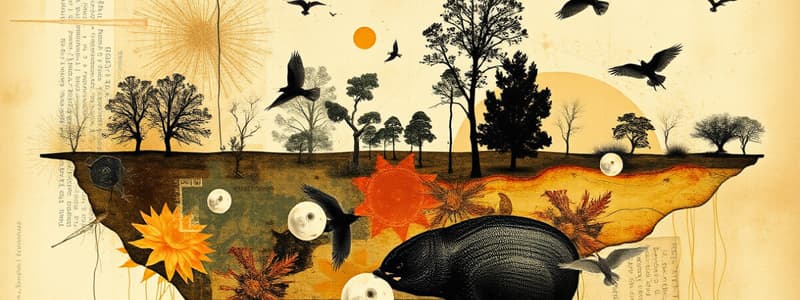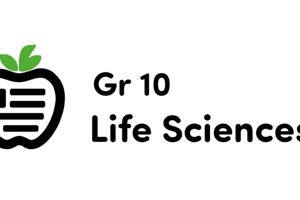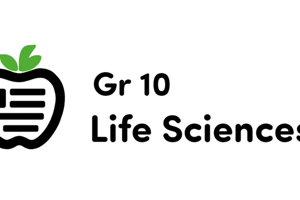Podcast
Questions and Answers
What is the primary source of energy input for life?
What is the primary source of energy input for life?
- Wind
- Soil
- Sun (correct)
- Water
What are photosynthetic organisms also known as?
What are photosynthetic organisms also known as?
Producers
What term describes organisms that feed on other organisms?
What term describes organisms that feed on other organisms?
- Producers
- Decomposers
- Consumers (correct)
- Photosynthetic organisms
Which type of organisms break down waste products and dead bodies?
Which type of organisms break down waste products and dead bodies?
What does feedback regulation in biological processes refer to?
What does feedback regulation in biological processes refer to?
Interactions between organisms in an ecosystem can be harmful to both species involved.
Interactions between organisms in an ecosystem can be harmful to both species involved.
What is the human Genome Project primarily focused on?
What is the human Genome Project primarily focused on?
____ is the application of computational methods to store and analyze biological data.
____ is the application of computational methods to store and analyze biological data.
What approach starts with the cloning and sequencing of DNA fragments from randomly cut DNA?
What approach starts with the cloning and sequencing of DNA fragments from randomly cut DNA?
Duplication, rearrangement, and mutation of DNA have no effect on genome evolution.
Duplication, rearrangement, and mutation of DNA have no effect on genome evolution.
What is the result of polyploidy?
What is the result of polyploidy?
Which type of selection involves humans modifying species by selecting for desired traits?
Which type of selection involves humans modifying species by selecting for desired traits?
According to Darwin, what happens to offspring in an environment that cannot support them?
According to Darwin, what happens to offspring in an environment that cannot support them?
Flashcards are hidden until you start studying
Study Notes
Energy and Matter in Life
- Life functions require energy transfer and transformation, essential for movement, growth, reproduction, and cellular activities.
- Primary energy input for life comes from the sun, which is transformed into usable forms by living organisms.
Organism Roles in Ecosystems
- Producers, such as photosynthetic organisms, convert sunlight into energy.
- Consumers obtain energy by feeding on other organisms.
- Decomposers, including fungi and bacteria, break down waste and dead organic matter, recycling essential nutrients.
Biological Interactions
- Interactions at all biological organization levels ensure systemic integration and functionality.
- Feedback mechanisms play a crucial role in self-regulation of biological processes, where outputs influence inputs.
Ecosystem Interactions
- Organisms interact with each other and with their physical environment, affecting ecosystem dynamics.
- These interactions can be beneficial, harmful, or neutral, influencing species survival and ecosystem stability.
- Human activities can disrupt ecosystems, notably contributing to global warming and climate change.
Evolution and Diversity of Life
- Evolution involves biological change whereby species adapt and accumulate differences from ancestral forms.
- The Human Genome Project enables comprehensive genomic studies, fostering understanding of gene interactions.
Genomics and Bioinformatics
- Genomics allows investigation of entire gene sets, aiding in understanding organismal biology, gene regulation, and evolution.
- Bioinformatics employs computational methods for storage and analysis of extensive biological datasets.
DNA Evolution
- Genome evolution is influenced by DNA duplication, rearrangements, and mutations.
- Polyploidy, particularly in plants, can lead to speciation through the creation of extra chromosome sets.
- Chromosomal organization comparisons among species reveal evolutionary relationships.
Gene Expression and Evolution
- Rearrangements and mutations of genes contribute to the emergence of new species.
- Transposable elements can change gene functions and expression patterns, offering adaptive advantages.
Natural and Artificial Selection
- Darwin's observations on variation and reproductive success provide the foundation for natural selection theory.
- Artificial selection occurs when humans deliberately breed organisms for specific traits, shaping species over generations.
Observations and Inferences
- Variation in inherited traits is common among populations, leading to differential survival and reproduction.
- Overpopulation leads to competition, raising the survival prospects of individuals with advantageous traits.
Studying That Suits You
Use AI to generate personalized quizzes and flashcards to suit your learning preferences.




